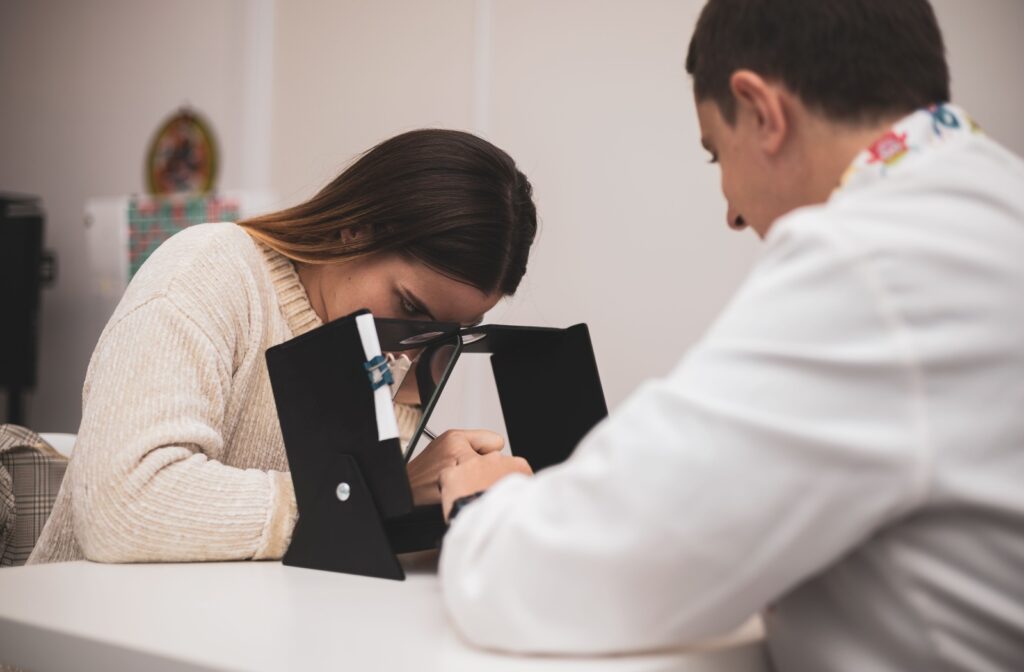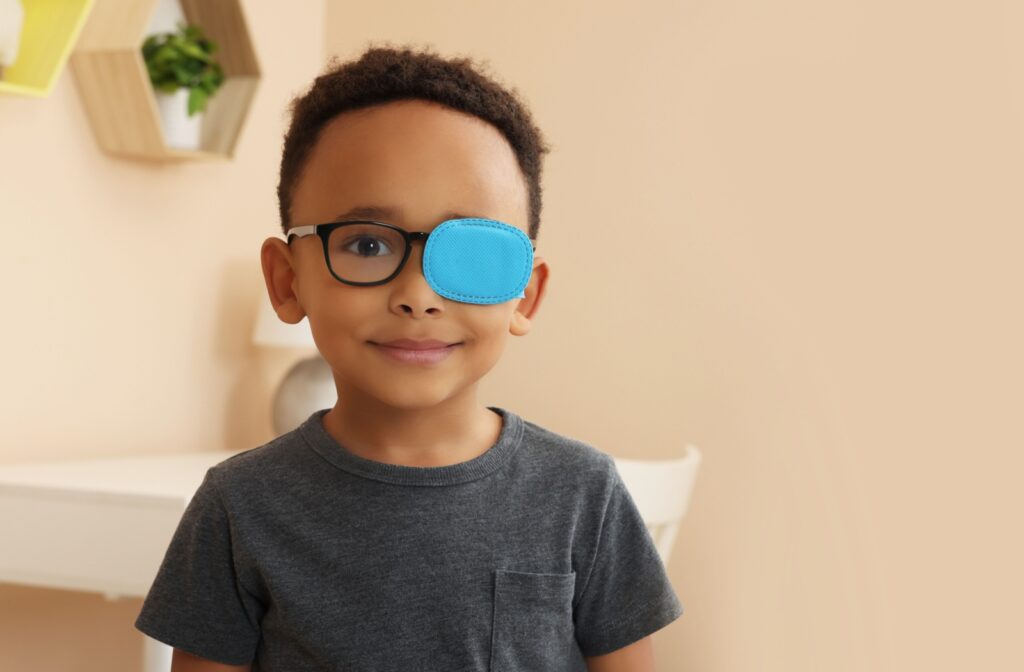Good vision plays a vital role in how we experience the world. Yet, many people struggle with vision issues like poor focus, eye strain, or coordination problems. One of the most effective treatments for these issues is vision therapy.
It’s a common misconception that vision therapy is just for kids. People of all ages can benefit from it.
There is no “best” age for vision therapy because it depends on each person’s unique needs and development.
Your eye doctor can give you personalized advice on whether you’re a candidate for vision therapy because they consider your vision needs and personal history. Booking an eye exam is a good place to start if you think you may benefit from vision therapy.
Understanding Vision Therapy
Before determining the “best age,” it’s essential to understand what vision therapy is all about. Unlike glasses or contact lenses, vision therapy dives deeper. It’s a customized program of exercises and activities designed to address the root cause of visual challenges.
It can help treat conditions like:
- Strabismus (misaligned or crossed eyes)
- Amblyopia (lazy eye)
- Convergence insufficiency
- Eye-tracking or focusing issues
- Visual processing difficulties
The exercises are tailored to each patient and designed to strengthen the connection between the eyes and brain. Think of it as physical therapy but for your visual system.
What’s the Ideal Age for Starting Vision Therapy?
Many parents and adults wonder if there’s a “perfect” age to begin vision therapy. But the truth is, there isn’t a one-size-fits-all answer. Simply put, your ideal age depends on the nature and severity of your vision-related issues and your personal goals.
Vision therapy is often associated with kids, but older teens and adults can experience noticeable benefits.
Debunking Vision Therapy Myths
A common misconception is that vision therapy is pointless after a certain age, often around 7 or 8 years old. However, modern research and clinical advancements have proved that neuroplasticity (the brain’s ability to adapt and change) continues into adulthood.
While the brain is more naturally adaptable in childhood, adults can still see results through tailored therapies.

The Benefits of Early Intervention
Early detection and treatment for vision problems can significantly support positive results. Many visual skills, such as eye coordination and tracking, are critical for learning and development.
Kids struggling with these skills may experience challenges excelling in school, sports, or other daily activities.
Kids with undiagnosed vision problems may develop coping mechanisms that make do until adulthood—like squinting to focus or avoiding certain activities—but targeted help can make visual tasks easier, saving you or your child a headache.
How Vision Therapy Helps Kids
Imagine a child struggling with strabismus (eye misalignment). Untreated strabismus could lead to lazy eye or reduced depth perception. Early treatment can minimize these risks while setting the child up for long-term success. Vision therapy also helps:
- Improve academic performance (i.e., reading comprehension, focus)
- Boost self-esteem in social & learning environments
- Prevent visual problems from getting worse over time
Spotting the Signs in Children
If you’re unsure whether your child needs vision therapy, look for these warning signs:
- Difficulty reading or skipping lines
- Frequent headaches or eye fatigue
- Trouble maintaining focus on tasks
- An aversion to homework or close-up work
If these symptoms sound familiar, book your child an appointment with their eye doctor.
Vision Therapy for Adults
If you’re wondering whether it’s too late for vision therapy, the good news is your eye doctor can help.
Adults with visual challenges, either long-standing or recently developed, can also benefit from vision therapy. Adults typically seek vision therapy for 2 main reasons:
- Enhancing visual skills for athletes, professionals, or those with specific requirements like precise focus or depth perception
- Rehabilitation after injury, such as concussions or strokes, to help retrain the brain to process visual information efficiently again
Benefits for Adults
Vision therapy benefits for adults can include:
- Relief from symptoms like frequent headaches, strained eyes, blurry vision, or difficulty focusing
- Enhanced performance in work or hobbies that rely on visual accuracy, such as graphic design or driving
- Recovery after neurological injuries, where visual problems like poor focusing or vision loss are common side effects
How to Determine If Vision Therapy Is Right for You
Whether you’re a parent considering treatment for your child or an adult exploring options for yourself, these steps can help.
Evaluate Your Symptoms
Consider how your vision interferes with your daily life, whether you’re experiencing challenges during work, school, or downtime.
Schedule a comprehensive eye exam with your eye doctor and talk about your concerns. Your eye doctor can assess your visual skills to determine whether vision therapy can benefit your needs.
Your eye doctor may have the training to offer vision therapy or be able to refer you to an appropriate vision therapist.
Set Goals
Consider what you hope the therapy will achieve. Can it improve your reading comprehension, focus, or recovery from injury? Do you need relief from frequent eye fatigue or headaches?
Think about how your vision concerns impact your life and what improvement might look like. Setting a realistic goal can help determine if vision therapy is a good fit. Your eye doctor or vision therapist can also help you understand how to set goals based on your specific vision problem.
Assess Your Vision Needs Today
Vision therapy offers the potential benefit of improved focus, coordination, and quality of life. Whether you’re looking for early intervention for your child or tackling challenges as an adult, the key is to act.
Early diagnosis and treatment often provide a lifetime of positive outcomes for kids. Adults still have access to empowering therapy options that break the myth of “too late.”If you’re unsure whether vision therapy is the right choice, start with an assessment. Contact our team at Signature Eye Care today to explore your options. Your clearer, brighter future awaits.



